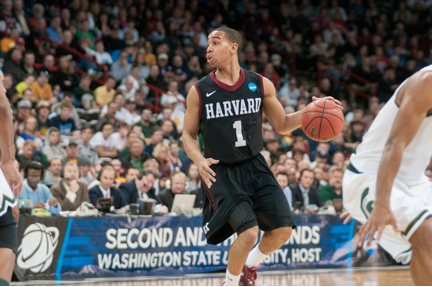
News
Summers Will Not Finish Semester of Teaching as Harvard Investigates Epstein Ties

News
Harvard College Students Report Favoring Divestment from Israel in HUA Survey

News
‘He Should Resign’: Harvard Undergrads Take Hard Line Against Summers Over Epstein Scandal

News
Harvard To Launch New Investigation Into Epstein’s Ties to Summers, Other University Affiliates

News
Harvard Students To Vote on Divestment From Israel in Inaugural HUA Election Survey
Men's Basketball Preview: Boston College

The Harvard men’s basketball team (10-3, 1-0 Ivy) has flipped the script after consecutive road losses to start its winter break, winning three straight entering Wednesday’s tilt against Boston College (7-7, 0-3 ACC). Below, The Back Page takes a look at the three main things to keep your eye on as Harvard takes on its crosstown rival in its penultimate non-conference matchup.
Clipped Wings: Although the Eagles are the traditional regional power, the Crimson has recently taken the upper hand in the rivalry. Harvard has beaten Boston College six straight times, most of which came in convincing fashion. The streak started with a 12-point Crimson win over the then-No.17 Eagles in 2009, and the closest margin of victory since then has been seven. Harvard won five straight games over Boston College by a combined 65-point margin before the rivals came to Cambridge last year, where Harvard put a 15-point pasting on the Eagles to kick off the New Year.
The cross-town dominance has coincided with a fall in the Boston College brand. The Eagles boast two quality NBA alumni in Milwaukee Bucks forward Jared Dudley and Oklahoma City super-sub Reggie Jackson, but the local product has suffered since their respective graduations. Since Harvard’s win in 2009, the Crimson has more wins in the NCAA Tournament (two) than the Eagles have appearances (one). After making March Madness seven times in the last decade, Boston College has gone just 33-63 over the last three years.
It is not surprising then that the Eagles are not flying as high as they once were. After opening conference play with a 23-point drubbing at the hand of Duke, Boston College has stayed competitive in consecutive close losses to Pittsburgh (61-60, OT) and Miami (60-56). Yet, Ken Pomeroy ranks the squad above each Ivy League team but Harvard and Yale, meaning that Amaker’s team will not take the Eagles lightly.
Turnover Issues: All season long, the Crimson has struggled to create space on offense. The emergence of sophomore sixth man Corbin Miller and improved three-point shooting of senior wing Wesley Saunders have alleviated some of these concerns, but turnovers continue to weigh down the offense. An inability to hold onto the ball was the culprit in a surprise early-season loss to Holy Cross, and the team has had more turnovers than assists six times in 13 games after doing so only seven times in 32 contests last year.
The main culprit is Siyani Chambers, whose turnover rate of 24.1 percent is by far the highest of any of the team’s principle ball handlers. Chambers offsets this with the second-highest assist rate on the team, but it helps explain his -3.6 net rating, the only negative number among players who have played at least 50 minutes this season. Amaker harps in every press conference on turnovers, a subject that is critical to the team’s guard-dominant offense.
Ill-Suited Defense: On the defensive end, Harvard appears well equipped to handle the Eagles. Boston College is an exceptionally poor shooting team, making just 44 percent of its shots and 30 percent of its threes. Top scorers Olivier Hanlan and Aaron Brown have put up points (31 a game between the two) but have been inefficient while doing so. Neither makes more than 45 percent of his attempts and Hanlan shoots just 27 percent from three, despite taking more than four a game. Against the Crimson, whose length has helped shut down opposing attacks all year, Hanlan and Brown will have to be significantly better than they have been so far for the Eagles to maintain a successful offense.
Want to keep up with breaking news? Subscribe to our email newsletter.
